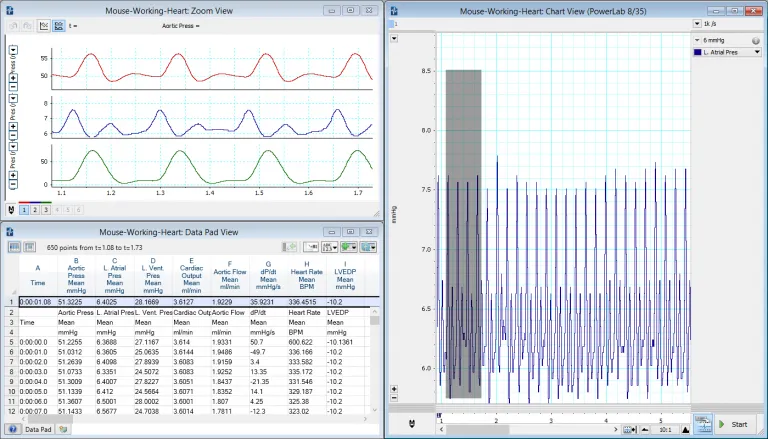Here at ADInstruments, we're lucky to be a part of a large and thriving research community. Join us in celebrating some of the incredible work that has been published by that community in June 2024.
Despite plasticity, heatwaves are costly for a coral reef fish.
This recent article by Van Wert et al., published in Scientific Reports, investigates the impact of marine heatwaves on the performance and thermal tolerance of arceye hawkfish (Paracirrhites arcatus) in Moorea, French Polynesia. The study found that marine heatwaves increased the energetic cost of daily activities such as recovery from burst swimming and digestion, while aerobic capacity remained the same. These rising costs could affect the

fish's energy budget and ecological roles. LabChart, along with a Dual Bio Amp amplifier, was utilized to analyze cardiac performance, revealing that hawkfish exhibited cardiac plasticity by increasing their maximum heart rate but still operated close to their thermal limits during heatwaves. This research highlights the vulnerability of coral reef fish to climate change-induced heatwaves and the potential ecological consequences.
Read More: https://doi.org/10.1038/s41598-024-63273-8
ADInstruments Products Used:
A GABAergic system in atrioventricular node pacemaker cells controls electrical conduction between the atria and ventricles.

This research by Liang et al., published in Cell Research, aimed to investigate the role of the GABAergic system in atrioventricular node pacemaker cells (AVNPCs) and its impact on cardiac electrical conduction between the atria and ventricles. The researchers discovered that AVNPCs possess an intrinsic GABAergic system, which significantly influences the excitability and conductivity of these cells.
By analyzing GABA-gated currents and the effects of GABAA receptor deficiency, they demonstrated that this system plays a crucial role in modulating atrioventricular conduction. Their findings suggest that targeting the GABAergic system could offer a novel therapeutic approach for preventing and treating cardiac arrhythmias, thereby improving heart function and reducing the risk of severe arrhythmias and cardiac arrest.
Read more: https://doi.org/10.1038/s41422-024-00980-x
ADInstruments Products Used:
Skin-inspired, sensory robots for electronic implants.
This article by Zhang et al., published in Nature Communications, describes a novel design strategy for soft robots that emulate the cohesive integration of skeletal muscles and sensory skins in vertebrate animals. These robots, comprising an electronic skin (e-skin) and artificial muscle, integrate multifunctional sensing and on-demand actuation into a biocompatible platform using an in-situ solution-based method. They are designed for various medical applications, such as detecting blood pressure, tracking bladder volume, sensing pH, delivering drugs, and providing cardiac function assessment and electrotherapy. These bio-inspired soft robots highlight the potential of integrated, adaptive, and multifunctional systems for advanced medical technology.
Read More: https://doi.org/10.1038/s41467-024-48903-z
ADInstruments Products Used:
Physiological responses of Atlantic cod to climate change indicate that coastal ecotypes may be better adapted to tolerate ocean stressors.

Perry et al., examined how juvenile Atlantic cod from the Swedish west coast respond to environmental stressors related to global climate change. The study exposes cod to various conditions including reduced salinity, increased temperature, decreased pH, and a combination of these stressors, observing their physiological responses over four weeks. Key findings reveal that coastal ecotypes of cod show better adaptation to stressors compared to
offshore ecotypes, suggesting genetic influence on stress response. The study utilized LabChart software and PowerLab systems to measure physiological parameters such as oxygen consumption and oxidative stress, providing insights into the resilience of different cod ecotypes under future climate scenarios.
Read More: https://doi.org/10.1038/s41598-024-62700-0
ADInstruments Products Used:
Growth/differentiation factor 15 (GDF15) expression in the heart after myocardial infarction and cardioprotective effect of pre-ischemic rGDF15 administration.
This article by Dogon et al., published in Scientific Reports, investigates the role of GDF15 in myocardial ischemia-reperfusion (I/R) injury. The study found that preconditioning with recombinant GDF15 (rGDF15) reduced infarct size and improved cardiac contractile recovery in Wistar rats, both in vivo and ex vivo. The cardiac parameters recorded through PowerLab and LabChart included heart rate (HR), left ventricular end-systolic pressure (LVSP), left ventricular end-diastolic pressure (LVDP), left ventricular developed pressure (LVDevP), and the first derivatives of LVDevP (+dP/dt and -dP/dt). These measurements highlighted the direct cardioprotective properties of GDF15, independent of inflammatory, endocrine, and nervous system influences.
Read More: https://doi.org/10.1038/s41598-024-63880-5
ADInstruments Products Used:
